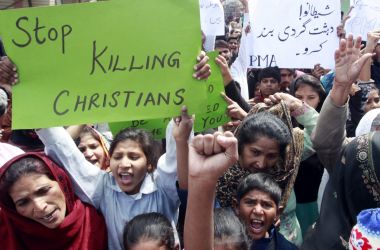Pakistani Archbishop: Prime Minister has failed to protect Christians

The leader of Pakistan's Catholics has accused the government of failing to act on new security measures designed to protect places of worship.
Archbishop of Karachi Joseph Coutts said the bomb attacks in which 17 were killed and more than 80 injured showed how Pakistan's Christians had been left vulnerable.
He said Nawaz Sharif, Prime Minister of Pakistan since June 2013, and his senior ministers had failed to act on a Supreme Court order last year which would have protected the Christians who died yesterday.
"This order of the Supreme Court has not been implemented," he said in a message to the Catholic charity Aid to the Church in Need. "This new act of terrorism has cruelly shown how defenceless we are due to this neglect."
The attacks, by a Taliban splinter group, took place at St John's Catholic Church and at Christ Church, part of the Church of Pakistan, in the Youhanabad district of Lahore.
In both cases, the bombers were stopped at the church gates by police officers and church guards and, unable to enter, blew themselves up at the entrances to the churches. The explosions took place within minutes of each other, creating a deadly chaos as broken window panes and blood scattered the sites. Two police officers who guarded the church gates were among the dead.
Members of National Commission for Justice and Peace joined in the criticism, accusing the police of failing to provide even basic security for churches.
Father Emmanuel Asi suggested that although police officers were among those who lost their lives, some security staff might not have been paying attention.
"In result of this negligence, many Christian people have lost their life and families their loved ones."
Police have begun using tear gas and water canons on violent protests that have erupted and Archbishop Coutts appealed for calm. He said violence and destruction of public property "serves no purpose".
He mourned the failure to protect Christians, who make up less than 2 per cent of the population of Pakistan. "Once again, the state has not been able to provide safety to its citizens. Millions of citizens continue to live in a state of constant tension and fear, not knowing what to expect next."
Referring to the fact that the Christian church is currently marking the penitential season of Lent, he called on surviving Christians in Pakistan to minster to the injured and traumatised.
"I appeal to all citizens of goodwill to be united in this time of sadness and loss. Our solidarity is essential to show the terrorists that we condemn their methods of senseless violence."
The UK charity Release also called on Pakistan to step up security for Christians to prevent mob violence.
One of Release's partners in Pakistan was injured in the bomb blast. Another has raised fears of communal violence that would play into the terrorists' hands.
"We commend the Christian and Muslim leaders who are calling for peace," said Paul Robinson, chief executive of Release. "If mob violence breaks out in Pakistan, it will play directly into the hands of the extremists. Their aim is to create the division and chaos in which they can thrive. We have seen Islamist terrorists use the same tactic in Nigeria."
He added: "Where there is no rule of law and no protection against extremism, frightened people will do whatever they can to defend themselves and could take the law into their own hands.
"The Pakistan authorities must act immediately to step up security for their country's vulnerable Christian community.
"There is a growing culture of intolerance in Pakistan which has led to these attacks. The authorities must redouble their efforts to change this hostile religious climate."
The Lahore church bombings are the latest in a string of extremist attacks against Christians in Pakistan.
Minority Christians suffer continued discrimination and persecution. Christian communities have been attacked and Christians accused of blasphemy and burnt alive. Release's partners in the region report a marked increase in the gang-rape of Christian girls and the problem remains of their abduction, forced conversion and marriage.
Barnabas Fund has sent emergency aid to its own partners on the ground who are working to bring relief in the midst of tragedy.
"We are paying a heavy cost," said Bishop Irfan Jamil, Church of Pakistan Bishop of Lahore. "We strongly condemn and lack words to express our feelings of the sad incident in the churches of Youhanabad. I salute those security personnel who lost their lives in stopping the terrorists and saved many lives. The grief and sorrow of the families who have lost their loved ones and those who have been injured is immeasurable. We pray for comfort among the grieved families and pray for speedy recovery of the wounded."
Youhanabad is one of the biggest Christian communities in the country, with more than 100,000 Christians among its population.
In Peshawar in September 2013, a twin suicide bombing killed 99 Christians and injured at least 140 who met to worship together. The Christian community in Peshawar is a small minority in an overwhelmingly Muslim population and the attack was one of the deadliest to occur against Pakistani Christians. Combined with Sunday's attacks, said Release, the message that the Taliban are sending to Pakistan's Christians is that they have the capacity to attack Christians whether they are in the minority or in the majority.
Since the devastation of the Peshawar attacks, police presence at churches has been stepped up, and it is thanks to the police and church guards who prevented the suicide bombers from entering Lahore's churches that the death toll was not higher.











